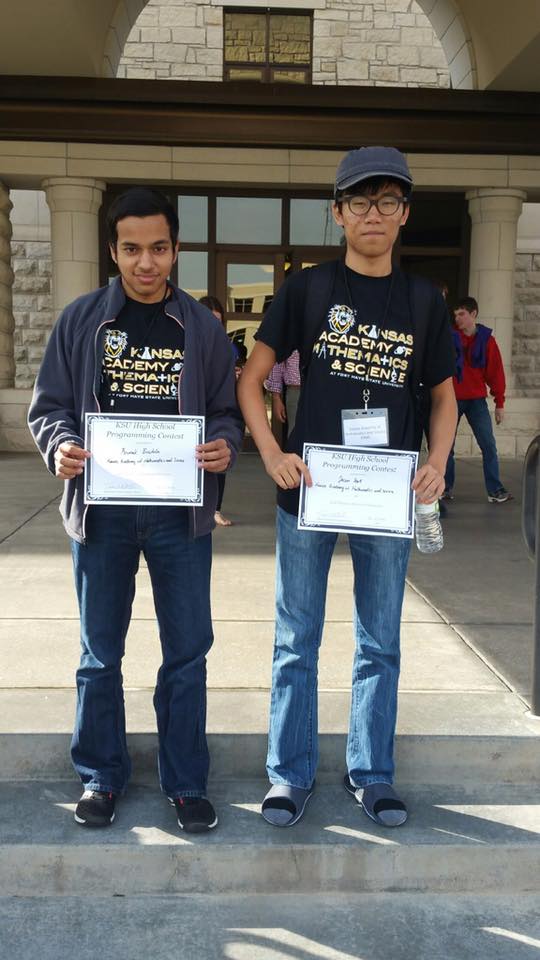Competitive Programming
Eric Menendez
April 15, 2017
 Kansas Academy of Math and Science (KAMS) students Jason Park and Rounak Bastola are masters of the computer-programming throw-down. Such competitions include the University of Kansas University High School programming competition in Lawrence, Kansas, and the Kansas State University High School programming competition in Manhattan, Kansas. The general idea for these competitions is for the competitors to work in teams. Each team is given one computer and one programming packet containing five to ten problems. The competitors must use math and code to solve these problems before submitting them for judging.
Kansas Academy of Math and Science (KAMS) students Jason Park and Rounak Bastola are masters of the computer-programming throw-down. Such competitions include the University of Kansas University High School programming competition in Lawrence, Kansas, and the Kansas State University High School programming competition in Manhattan, Kansas. The general idea for these competitions is for the competitors to work in teams. Each team is given one computer and one programming packet containing five to ten problems. The competitors must use math and code to solve these problems before submitting them for judging.
Park has written programming for more than the last ten years and participates in many programming competitions, winning first or second place in most of them. He and Bastola are proud of these accomplishments. Having met at KAMS, Park and Bastola have since teamed up with each other for many competitions. For the Kansas State University programming competition, the two drew on their individual strengths to win 2nd place. Park is better at making computer algorithms, and Bastola is better at doing math. "So he interpreted the problem mathematically, and I designed an algorithm from it and wrote code for it," Park says. Because of how well the two worked together, Bastola and Park will likely team up for future competitions.
Park has always been a competitive person because any kind of competition, including the countless programming competitions he has participated in, motivates him to grow as a software engineer. This interest began when he was nine, when he thought about having his own personal website. "I was fascinated in the fact that I can actually create something working in my computer," says Park. Since then, he has devoted himself to studying programming and creating computer programs and smartphone applications. "It feels awesome when I see my program improving peoples' lives." Bastola also values the computer-programming field. "It directed me towards computer science," he says, which became one of his majors along with math.
Having competed previously in Dallas, Texas, Park and Bastola looked forward to the recent Dallas Hackathon, or Earthhack. Park attended high school one hour away from the Dallas area before coming to KAMS. He has made friends at these competitions, with a few becoming his best friends. Both Park and Bastola attended the Hackathon as a team of five, teaming up with some of Park's friends. The team was the winner of the Make School Challenge at the Hackathon.
KAMS director Roger Schieferecke and other KAMS faculty members recommend students to participate in programming or other competitions, while supporting them throughout.
KAMS helps students not only by letting them attend college classes but also by letting them choose which classes they wish to take and encouraging them to participate in relevant competitions. The program also lets students share research with their professors.
Beyond tournaments and academic research, KAMS offers its students plenty of free time, allowing them to develop themselves. Since last February, Park has been working for a French startup company as a software developer. "I am pretty sure that for my career path, it was a good choice to come here rather than to stay in my previous school," Park says. Bastola also acknowledges that the program has given him the experience he needs to move forward with his career in computer science.